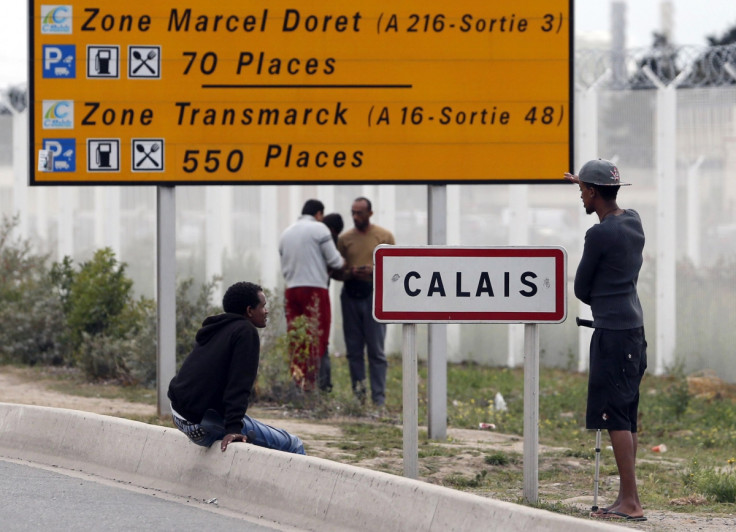Four suspected smugglers arrested in Calais for selling dinghies to desperate migrants
Among the arrested are a French couple caught with cash and a migrant hiding in the boot of their private car.
Border Police in Calais, France, have arrested four people, including three Frenchmen and an Iranian, suspected of smuggling migrants to the UK. Migrants, some fleeing war and poverty in the Middle East, Africa and Asia, have gathered in their thousands on the French coast near the port of Calais in hope of making their way to the UK.
Thousands of migrants remain camped around Calais and many have attempted to reach the UK, sneaking on to lorries, hopping on trains and even walking through the tunnel. Many have died while attempting to cross and people-smugglers have taken advantage of their desperation, offering to take them across the Channel, one of the world's busiest stretches of water, at a cost of up to £13,000.
According to the Atlantico newspaper, the four suspects are aged 23 to 44 and are believed to have helped migrants cross the Channel from the Pas-de-Calais region.
Caught with a migrant hiding in the boot of a private car and €18,720 (£15,980) in cash, two suspects – a French couple – were charged on Monday (22 August 2016) by the prosecutor of Boulogne-sur-Mer.
The French border police (PAF), which covertly recorded phone calls between the suspects, said the alleged smugglers had assisted a number of migrants to cross into the UK, both by road and by sea.
"According to our information, they are behind the crossing of a boat carrying six migrants that was stopped in June off the coast of Calais and of another one with three occupants on board, as well as three individuals hidden in car trunks," the PAF was quoted as saying.
"This shows that this is a truly organised business and not of persons operating on an occasional basis."

The PAF claims that the smugglers would buy "small boats", particularly inflatable dinghies, which they would offer to migrants for remuneration.
News of the arrest comes a day after coastguards based in the English Channel rescued six suspected migrants from an inflatable dinghy. The men were reportedly stranded on a sandbank between Dover and Calais during the early hours of the morning on Thursday (25 August).
However, the French border police estimates that operations of this sort are "still marginal" because of the "very high" price demanded by smugglers, combined with the difficulty of crossing the Channel, reputed to be one of the most dangerous straits in the world due to its strong currents and width.
Since the beginning of 2016, 28 smuggling networks hoping to cash on migrants' desperation to cross to the UK have been dismantled, and 560 smugglers arrested. However, this figure is already higher compared with the previous year: only 18 networks were dismantled, and 738 smugglers arrested in 2015, according to the Pas-de-Calais prefecture.
They are all aged 23 to 44 years and are believed to have funneled migrants in the UK, from the Pas-de-Calais. These people face a French couple, jailed 22 August by the prosecutor of Boulogne-sur-Mer. So they hid a refugee in the trunk of a passenger car, they were caught. Police also recovered from them €18,720 in cash.
The PAF conducted a telephone spinning with the alleged smugglers and managed to assign several attempts passages of migrants by land or sea. "According to our members, they are behind the passage of a vessel of six migrants arrested in June off the coast of Calais, then another with three people on board but also three individuals hiding in car trunks" said the service.
A record 7,300 people living in Calais Jungle camp
Last month, a new census from L' Auberge des Migrants/Help Refugees revealed that more than 7,300 people now live in the Calais Jungle migrant camp near the port of Calais access point to the Channel Tunnel. There were 6,123 migrants living in the camp in May – up from 4,946 after the eviction of the southern half of the so-called jungle in March.
Help Refugees co-founder Josie Naughton said the rise was unexpected, given previous projections that fewer people would travel during the holy month of Ramadan, increased border security between Turkey and the European Union, and repeated attempts from both French and British authorities to discourage people from making the journey.
But as the migrant crisis in the port continues, French authorities have been carrying out theirstrongest crackdown on migrants for five years, evicting, arresting, detaining or deporting migrants from France.
In 2015, France expelled or deported more than 10,500 migrants from its territory, including people seeking asylum from poverty or war that were eligible for refugee status, in a violation of international laws and conventions.
© Copyright IBTimes 2024. All rights reserved.






